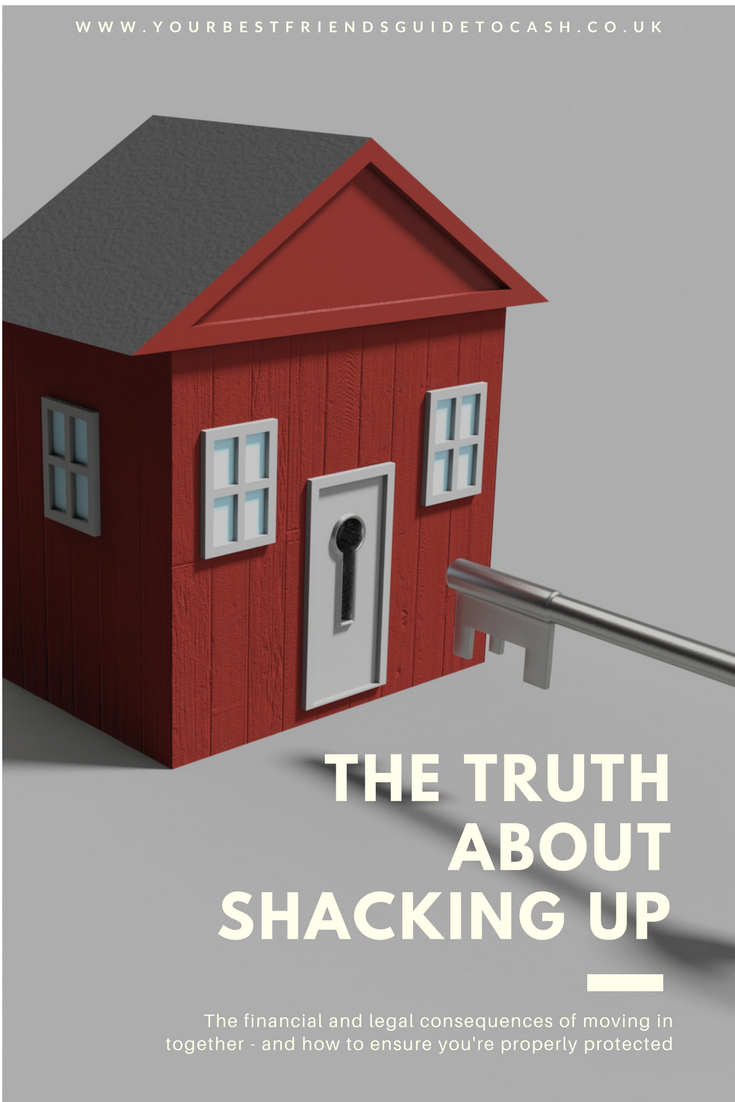
Shacking up, cohabiting or living in sin. However you label it, it means the same thing – moving in with your partner before you walk down the aisle first.
Luckily, gone are the days when it was considered scandalous to move in with your partner before marriage. In fact, these days I’d be more shocked if friends of mine waited until after their wedding to live together for the first time.
Couples who live together without being married are now the fastest-growing type of family in the UK, with figures from the Office for National Statistics (ONS) showing that the number of people who cohabit has more than doubled to 3.3 million since 1996.
What might have once been considered a trial run for marriage, now just makes financial sense
With the average age of an unassisted first-time buyer now standing at 30, many of us are opting to get on the property ladder before splashing out on a wedding. Because, let’s face it, unless you are a loyal customer of the Bank of Mum and Dad where you are handed a hefty deposit and know they will bankroll your big day, saving for a home and wedding while forking out rent is nigh on impossible. So, a growing number of people are shacking up instead so we can scrape together enough to get our first home.
COMMON LAW MARRIAGE IS A MYTH
Once we become homeowners, those who are not married will find they have fewer rights when it comes their property. Worryingly, many couples think that after of years of living together, they become common law husband and wife, with the same rights as married couples. But this isn’t the case. As far as the law is concerned, common law marriage hasn’t existed in England and Wales since 1753.
So, if you are buying a new place together, think carefully about how you want to own it – as what you decide will make a massive difference to your rights.
Unless specified, couples own their home as joint tenants. This means that together they both own the whole of the home. But, with tenants in common, each owns a set share – this can either be half each, or a defined percentage. Before you sign on the dotted line, it is crucial to get legal advice.
Drawing up a trust deed, or declaration of trust, sets out the share of equity to which each owner is entitled on sale. The owners can come up with whatever formula they wish for working this out and the formula might include reference to differing contributions to mortgage payments,
It’s a way for couples who have put unequal deposits into a property to protect their share in case they split up – which will also do a great deal to ease the fears of families who gift deposits to their children.
For instance, should one of you put in 60% of the deposit and the other just 40%, in the event of break-up and sale, the initial deposits should be returned as such.
WHAT ABOUT A JOINT BANK ACCOUNT?
One decision you and your partner will have to make is whether to open a joint bank account. It may be tempting to set up a joint bank account for paying out bills, but the risks might outweigh the advantages.
Just living with someone, or being married to them, will not affect your credit rating alone but as soon as you open a joint bank account together you will be ‘co-scored’. What’s more, but the credit record of the other account holder will have an impact on your own score.
This means that if you or your partner applies for credit in the future, the lender will be able to check both of your credit records.
If your partner hasn’t repaid their debts on time, or – worse – has been declared bankrupt, it will affect your ability to get credit. Proceed carefully here.
MAKE SURE YOU GET A WILL
It may sound surprising, but two-thirds of people in the UK never get around to making a will. Most of us mean to, but put it off thinking that there’s no hurry, while others think we don’t really have much of any significant value to leave to anyone.
Many of us also assume that, if the worst did happen, the law would ensure our belongings went to our loved ones anyway. But unfortunately, this is not the case, especially couples who are unmarried.
Without a legal will, all your property and assets will automatically pass to your family. Your partner will not be entitled to anything – which is probably not what you want.
It doesn’t matter how long you were together or how much you were in love. Instead, the law dictates that everything will go to your nearest blood relative, regardless of your wishes. If there are family tensions, this could mean that unless they are able to buy out your relatives, your partner is forced to sell up and lose their home at a time when they should be dealing with their grief.
Many people put off getting a will drawn up due to the high solicitor’s costs: a basic will can start at between £100 and £300, but the bill could rise to for more complex planning.
To get around forking out cash unnecessarily, you might be tempted by the far cheaper alternative of a DIY will which costs less than £20.
But while an off-the-shelf will may seem very attractive at this price, it can be a risky approach: if errors are made, or if the strict witnessing rules are not followed correctly, the document could be invalid.
In fact, according to figures from the Co-operative Legal Services, around 38,000 families every year will go through a prolonged probate ordeal as a result of a poorly drafted or ineffective DIY Will.
What’s more, up to 10% of the value of a person’s estate can be taken up by additional fees caused by an ineffective Will. With the average estate in the UK worth £160,000, this could equate to a bill of around £16,000 in unnecessary fees.
If you don’t already have a solicitor, visit The Law Society’s Find a Solicitor website and search under “Family and relationships” to get details of solicitors in your area. Or call 020 7320 5650.
Follow me on social media
